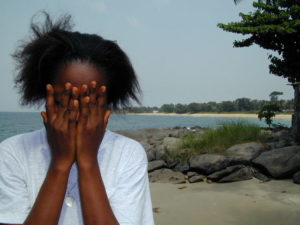Last week I quietly and quickly read through text correspondence as concerned women in a WhatsApp network I belong to mobilized to support a 55-year old woman who was brutally gang-raped by 15 men belonging to the highly esteemed Poro Society. Within a day or two, donations were made, a press-release written, edited, argued about and diligently sent out to press-houses in Freetown. I was both impressed at the pace in which resources were mobilized and the sensitivity given to ensure privacy was provided to the victim by the group of 100 plus women within the WhatsApp network. I did not participate nor offer words to the group. I felt the visceral need to bear witness.
A week later, more media houses picked up the story, from television to radio and the blogging sphere. Yet again, an outcry from many Sierra Leoneans, especially women’s groups of all ages and network affiliations. I have still not re-shared the story because these heartfelt outcries feel repetitive at best and un-sustained at worse. More truthfully, I felt helpless.
I’ve spent a significant part of my career and life speaking against or working within anti-violence programs and campaigns. In Sierra Leone, before it was ‘cool’ or somewhat ‘safe’ to speak more broadly about sexual reproductive rights and broader violence issues, I was shouting on any platform I was afforded that our country remains unsafe for ALL women and girls, therefore failing the rights and protections of over 50% of its population.
At a policy level, it is clear that women’s rights and protections are still not prioritized outside of a medicalized health perspective. The Republic of Sierra Leone has always failed Sierra Leonean women and at times, so has the women’s and feminist space. It is time we face this truth if immediate and true transformation is to take place from a much needed feminist approach to addressing and demanding recourse on violence against women and girls in Sierra Leone.

Let us Remember, we have come far
I remember several years ago speaking to a friend of my own experiences and in response she interrogated and minimized my story, in that moment I felt double victimized. Today, she’s a resounding voice on violence against women. Her growth and affinity for women’s issues simultaneously startles and impresses me. Yet, it is also a reminder that we’ve evolved as a Sierra Leonean society in when and how we speak about violence, especially sexual violence against women and girls.
In the old days, as young as five years ago, it was a few voices like Naasu Fofana and others who used their personal experiences with violence to demand for social and legal change. It was LAWYERS and other women’s groups organizing protests, twisting and bending the health and legal system to seek justice for survivors while struggling to demand that we hold perpetrators accountable.
Today, we’ve seen an evolution of these movements, resulting in a ‘state of emergency against violence’ by President Julius Maada Bio, with the emergence of a policy that holds perpetrators of sexual violence against children accountable. The First Lady’s ‘Hands off our girls’ campaign has a national and high-level political spin to it, complimenting the ‘black Tuesday’ movement ignited by Asmaa James in collaboration with Purposeful, artists and other activists.
Asmaa, a popular and influencing media figure in Sierra Leone amplified the story of the 5-year-old who was brutally raped and left disabled, igniting national outrage from every corner of the country as more stories of sexual violence on children (young girls) outpoured. Many Sierra Leoneans had their heartstrings tugged at, which led to further demands for policy and legal reforms against perpetrators of sexual violence against infants and children. The same heartstrings weren’t quite as fine-tuned when Hannah, a 19-year-old sex-worker was raped, murdered and left on the sidewalk of Freetown’s most popular beach three years ago. We’ve come far, but we haven’t quite moved consciousness when it comes to spotlighting pervasive violence against women.
Women Matter Too – Politicizing Violence against Women (VAW)
“Feminist efforts to end male violence against women must be expanded into a movement to end all forms of violence. Broadly based, such a movement could potentially radicalize consciousness and intensify awareness of the need to end male domination of women.”
(hooks 1984, 130–131)
Last year I did some work with African Women’s Development Fund (AWDF) to map out evidence-based prevention of violence against women in Africa. AWDF was clear that the mapping exercise focus on understanding the Africa Women’s Rights space working on prevention (and response) to ending violence against women. A primer on key terms, trends, approaches, and evidence used to frame violence against women (VAW) prevention programming was developed.
On a personal note, this work was deeply rewarding because it also served as a re-education on early 1980s feminists successful work in bringing violence against women to the agenda of international organizations and global policy. It is the work of feminists, globally, that resulted in the UN General Assembly adopting a resolution on domestic violence, the first in a series of feminist gains to put violence against women at the forefront of the international human rights agenda. To learn more on intersectional feminist approaches to ending violence against women, go here.
Feminist work to politicize and bring to the frontal lobe of global policy the prioritization of violence against women operates on the fundamental premise to transform its underlying drivers, namely unequal gender power dynamics between men and women and gender discrimination, while ensuring that interventions support women and girls’ agency and empowerment. Africa has some of the highest rates of VAW at 45.6% compared to 35% globally. Evidence from research and programmatic experience shows that VAW in low- and middle-income countries (LMICs) can be prevented through interventions that target these key drivers of violence and how they shape individual and collective attitudes, norms, and behaviors.
It is time that as Sierra Leonean feminists we re-calibrate our strategy to end violence against WOMEN and girls in Sierra Leone and this includes running campaigns that not only demand that hands be taken off our girls or only we spring into action only when we hear stories of infantile rape, that also we approach violence work more holistically. With the understanding that violence in its full breadth – psychological, emotional, physical and sexual in the domestic and public sphere, against girls is equally as important as denouncing violence against women.
We aren’t safe on an individual level until as a collective, every Sierra Leonean woman and girl is safe.
A call for re-strategizing on violence against women – prevention and response
In sub-Saharan Africa, 22.3% of women aged between 15 and 49 reported experience physical and/or sexual violence by an intimate partner within a 12-month period. Statistics for Sierra Leone are difficult to come by despite gains made by organizations like the Rainbo Center, the only response service for gender-based violence in the country, to collect data for more evidence-based advocacy policy change. With data scarce ( and somewhat available), and empirical evidence at an all-time high in Sierra Leone, one has to wonder what would embolden 15 men to rape a middle-aged woman at a time, when ‘political will’ appears elevated with the President even declaring a ‘state of emergency’ to address high violence incidences against girls in particular.
The truth is, on a social, legal and political level, we have not really moved the needle to address the underlying causes of violence; we never prioritized women’s experiences and wellbeing in the discussions around anti-violence work despite a media-frenzy focus on ‘sexual violence’ against children and girls. Women’s experiences with psychological and intimate partner (domestic) violence never quite stir national consciousness and victims continue to suffer in silence.
If there was ever a time to do better, it is now. It is about time we demand that perpetrators, mostly men, take their hands off ALL women and girls in Sierra Leone, supported by a political framework willing to do tangible transformational work to ensure a safer Sierra Leone for girls and women.

Fatou Wurie is a social justice advocate from Sierra Leone working in the social innovations, humanitarian action and public policy space. She holds a masters from the University of a Oxford and is a Moth Storyteller. This post was first published on LinkedIn.

Violence against women (VAW) is a major problem worldwide, with one in three women experiencing violence in their lifetime. While interventions to prevent violence (primary prevention) are extremely important, they can take many years. This review focuses on secondary and tertiary prevention interventions that address the needs of survivors of violence and aim to prevent recurrence. This review also focuses on studies taking place in low and low-middle income countries, where rates of VAW are highest.